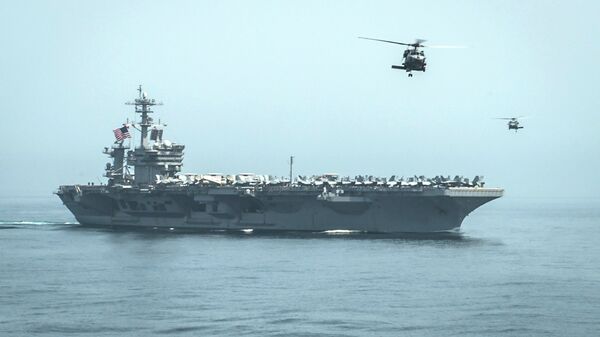Randall Schriver, US assistant secretary of defense for the Indo-Pacific security affairs, said, "We had our first aircraft carrier visit to Vietnam since the end of the Vietnam War and we very much hope we can reach agreement with our colleagues in Vietnam for a second aircraft carrier visit this year."
The enhanced military cooperation between Washington and Hanoi is closely related to the South China Sea issue. With the turnaround in the China-Philippines ties, Vietnam has become an important anchor for the US to intervene in the South China Sea, since Hanoi, which has the most maritime claims on the waters, is quite stubborn over its demand. Washington wants to intervene in the South China Sea row through cooperation with regional countries. Against this backdrop, Vietnam is an ideal partner for the US.
However, the US will not easily let go of Vietnam. In the process of comprehensively promoting the Indo-Pacific strategy, the US emphasizes the so-called freedom of navigation and rules-based regional order.
Meanwhile, it tends to strengthen its alliance with nations such as Japan and Australia while seeking partnership with Southeast Asian countries including Vietnam and Singapore. By stepping up military interaction with Vietnam, the US may make the Indo-Pacific strategy more popular in the region.
Nevertheless, US aircraft carrier's visit to Vietnam will not practically affect the security of the South China Sea as it is difficult for both countries to carry out true military cooperation any time soon. But such a visit will have negative diplomatic influence on China in the short run. At present, China and ASEAN are negotiating the Code of Conduct (COC) in the South China Sea and both sides still disagree on issues such as the COC having binding force. The US carrier may roil the waters of the South China Sea and instigate ASEAN members to antagonize China. This will complicate COC negotiations, heightening tensions in the waters.
But when it comes to economic collaboration, the US and Vietnam may make breakthroughs. Vietnam was keen to join the Trans-Pacific Partnership; it needs the US big market. Vietnam is not willing to rely totally on China for investment. This country seeks to diversify its investment sources by attracting capital from the US, Japan and South Korea, which goes with Vietnam's long-term interest.
As a great power, China should confidently eye the development of US-Vietnam ties. Even when bilateral relations have been choppy over the South China Sea disputes, long-term stable ties between China and Vietnam have ensured multichannel communication. Beijing has to be aware of ASEAN's ambivalence toward their relations with China. One the one hand, they welcome the China-proposed Belt and Road Initiative (BRI), hoping to achieve win-win economic cooperation with China. On the other, they lack trust in China on security issues. China should separate economic and security subjects.
While shelving disputes and managing maritime crises, China should continue to promote regional cooperation initiative such as BRI. This will be a priority for China's neighborhood diplomacy in the future.
This article was originally published in Global Times.




